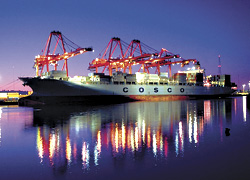Like any right-thinking Seattleite, I’ve happily signed up for most every tax increase offered me over the years. Parks, schools, aquariums, traffic-circle beautification projects…I’ve voted for them all. Tim Eyman would hate me. But there’s one tax I would vote down in a heartbeat, if only given the chance. And it’s one I don’t even pay. That’s the property tax levied by the Port of Seattle.
You’d be hard-pressed to find a government agency more undeserving of taxpayer confidence than the Port. The latest proof comes from a state audit released in December, which found that as the Port has handed out billions of dollars in construction contracts, it’s been way too cozy with the engineers, consultants, and others feeding at the trough. Port staff often didn’t bother with competitive bidding, laxly enforced contract terms, and didn’t keep proper records. The auditors estimate the Port overspent by nearly $100 million over a three-year period. And that figure only reflects the small sample of Port projects auditors were able to examine in detail. (In some cases, Port staff wouldn’t provide documents or answer questions.)
All this would be fine, perhaps, if the Port were only wasting the money of its customers; i.e., the international cargo shippers, mindless cruise-ship vacationers, and airlines that pay to use its facilities. But the Port also gets to piggy-back on the property tax. Under a state law that dates back to 1973, the Port is free to collect up to 45 cents per $1,000 of assessed value on your home.
Until recently, the Port kept its take from the levy flat by reducing the tax as property values increased. Throughout the 1990s, the Port collected about $36 million per year. But starting in 2002, the Port began to dramatically lift the lid. The justification at first was post-9/11 doldrums. Yet even as the economy came back, the Port just continued to ride the frothy wave of Seattle real estate. This year, a 23-cent levy approved by the Port’s elected commissioners will generate almost $80 million, or twice the take of just five years ago.
Efforts to shut down the Port’s tax-levying authority have so far been for naught. Former Port Commissioner Alec Fisken, who has long wanted to phase out the tax, was ousted last year by a business-backed candidate, Bill Bryant, who pledged to keep it. There’s no surprise the business community likes this tax: Business derives the most benefit from the Port’s activities (gotta love those no-bid contracts), while homeowners pay three-quarters of the bill.
The Port has defended the tax by claiming that the proceeds are specially earmarked for “environmental” projects and the like. It’s the same strategy my alma mater (which happens to be filthy rich) uses to try to get alumni to contribute: “Pay no attention to the $35 billion endowment; your money will be used for student financial aid.” But as any alum who made it through Econ 101 knows, money is fungible and dollars are interchangeable. “It’s just rhetoric,” says Fisken. Port staff, he says, will claim the tax levy goes toward “whatever the most popular projects are.”
Fisken believes the Port would actually be better off without the tax subsidy—which, by the way, other big West Coast ports like Los Angeles and Vancouver, B.C., manage to live without. He says it would force the agency to cut bloated overhead. The Port would also no longer have the luxury of just sitting on property like the one at Interbay, under the Magnolia Bridge, where the Port has been in a zoning standoff with the city. (The Port wants to open up the area to nonindustrial uses; the City Council opposes the idea.) And for sure, killing the tax would force the Port to clean up the egregious failings uncovered in the audit, because it, finally, couldn’t afford them.
But Olympia, so far, has been no help. Just last week, a bill from state Sen. Karen Keiser, D–Des Moines, to repeal the Port’s tax authority failed to make it out of committee. Yet at the same time, state Democrats have been eagerly advancing an idiotic piece of legislation, known as House Bill 2601, that aims to slow down the voter-initiative work of Tim Eyman by snooping on his teams of paid signature-gatherers.
The irony is that Tim Eyman is exactly who we have to thank for the Port audit being done at all. His Initiative 990, passed in 2005, is what gave the state auditor authority to start digging into the spending habits of government agencies. I can only hope that 2601 fails, and that Tim and his signature-gathering squad create an initiative that will finally bring the Port to heel.
Please, Tim, do it for me. If I agree to vote down a playground sometime, is that a fair trade?








